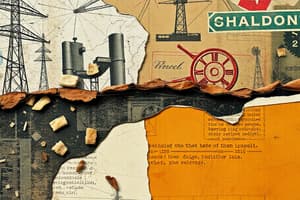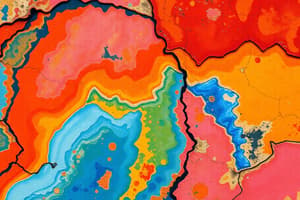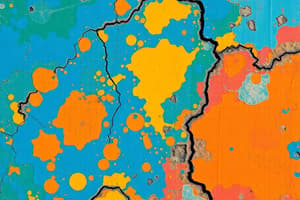Podcast
Questions and Answers
What is weathering?
What is weathering?
- The process of erosion by wind
- The mechanical and chemical processes that change objects on Earth's surface over time (correct)
- The breaking down of rocks into smaller pieces by water
- The formation of new rocks
What is the result of weathering over thousands of years?
What is the result of weathering over thousands of years?
Sediment
What happens to the chemical makeup of a rock during mechanical weathering?
What happens to the chemical makeup of a rock during mechanical weathering?
It is not changed.
What is ice wedging?
What is ice wedging?
An example of mechanical weathering is when the intense temperature of a forest fire causes nearby rocks to ______.
An example of mechanical weathering is when the intense temperature of a forest fire causes nearby rocks to ______.
How do plants cause weathering?
How do plants cause weathering?
What role does water play in chemical weathering?
What role does water play in chemical weathering?
Mechanical weathering occurs fastest in cold, dry areas.
Mechanical weathering occurs fastest in cold, dry areas.
What increases the rate of chemical weathering more than rain or water?
What increases the rate of chemical weathering more than rain or water?
What is oxidation in the context of weathering?
What is oxidation in the context of weathering?
Which of the following processes is an example of abrasion?
Which of the following processes is an example of abrasion?
Flashcards are hidden until you start studying
Study Notes
Weathering and Its Effects
- Weathering is the process that breaks down rocks over thousands of years into smaller pieces known as sediment.
- It encompasses both mechanical and chemical processes affecting Earth’s surface.
Mechanical Weathering
- Mechanical weathering does not change the chemical composition of rocks; for example, granite remains granite after weathering.
- It involves physical processes that naturally break rocks into smaller fragments.
Examples of Mechanical Weathering
- Intense temperatures from forest fires can cause rocks to expand and crack, demonstrating mechanical weathering.
- Ice wedging is a significant mechanical weathering process where water enters rock cracks, freezes, expands, and ultimately breaks the rock apart.
Role of Surface Area
- Sand and clay are products of mechanical weathering, affecting the interaction with water, as seen when water sticks to sand surfaces.
Abrasion
- Abrasion is a form of mechanical weathering characterized by the grinding of rocks via friction or impact.
Biological Influences on Weathering
- Plants contribute to mechanical weathering as growing roots push against rock cracks, promoting their eventual breakage.
- Animals burrowing into the soil create spaces for water to penetrate, facilitating weathering and breaking down rocks.
Chemical Weathering Overview
- Chemical weathering alters the composition and size of rocks, such as granite, versus mechanical weathering, which does not affect chemical makeup.
- It transforms minerals in rocks into new substances, significantly influencing the landscape.
Role of Water in Chemical Weathering
- Water is essential in chemical weathering, as it dissolves many substances, although the dissolution of rock minerals occurs slowly.
Acids and Weathering
- Acids enhance the rate of chemical weathering more effectively than water, by attracting and dissolving mineral atoms.
Oxidation in Weathering
- Oxidation, a chemical weathering process, primarily derives oxygen from the air to react with other elements or compounds.
Factors Affecting Weathering Rates
- Mechanical weathering is more rapid in areas with frequent weather changes, while chemical weathering accelerates in warm, wet environments.
Studying That Suits You
Use AI to generate personalized quizzes and flashcards to suit your learning preferences.




